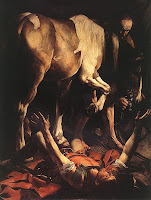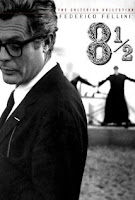 |
| Ed Wood |
Wednesday, March 30, 2011
The Legacy of Ed Wood or the Director that Simply Couldn't
 I am a spiritual health and wellness coach as well as a blogger/writer, podcaster, book & movie reviewer, and an educator and language instructor. I am fluent in five languages and have a variety of interests and occasionally write fiction and poetry.
I am a spiritual health and wellness coach as well as a blogger/writer, podcaster, book & movie reviewer, and an educator and language instructor. I am fluent in five languages and have a variety of interests and occasionally write fiction and poetry.I am passionate about health and wellness and practice and advocate psychoanalysis, Intermittent Fasting, nutrition, and mindfulness.
You can reach, contact and follow me on Twitter or Facebook @Arashmania and book a free session with me via my Calendly link on the top right side of my blog!
Friday, March 25, 2011
Giving St. Paul a Chance and his Influence on Christianity
 | ||
| The Conversion on the Way to Damascus | by Caravaggio |
 I am a spiritual health and wellness coach as well as a blogger/writer, podcaster, book & movie reviewer, and an educator and language instructor. I am fluent in five languages and have a variety of interests and occasionally write fiction and poetry.
I am a spiritual health and wellness coach as well as a blogger/writer, podcaster, book & movie reviewer, and an educator and language instructor. I am fluent in five languages and have a variety of interests and occasionally write fiction and poetry.I am passionate about health and wellness and practice and advocate psychoanalysis, Intermittent Fasting, nutrition, and mindfulness.
You can reach, contact and follow me on Twitter or Facebook @Arashmania and book a free session with me via my Calendly link on the top right side of my blog!
Saturday, March 19, 2011
Writer's Block and the Artistic Nightmare of Having Nothing to Say
 I am a spiritual health and wellness coach as well as a blogger/writer, podcaster, book & movie reviewer, and an educator and language instructor. I am fluent in five languages and have a variety of interests and occasionally write fiction and poetry.
I am a spiritual health and wellness coach as well as a blogger/writer, podcaster, book & movie reviewer, and an educator and language instructor. I am fluent in five languages and have a variety of interests and occasionally write fiction and poetry.I am passionate about health and wellness and practice and advocate psychoanalysis, Intermittent Fasting, nutrition, and mindfulness.
You can reach, contact and follow me on Twitter or Facebook @Arashmania and book a free session with me via my Calendly link on the top right side of my blog!
Monday, March 14, 2011
The Influence of Imagination on Fear and Anxiety
 I am a spiritual health and wellness coach as well as a blogger/writer, podcaster, book & movie reviewer, and an educator and language instructor. I am fluent in five languages and have a variety of interests and occasionally write fiction and poetry.
I am a spiritual health and wellness coach as well as a blogger/writer, podcaster, book & movie reviewer, and an educator and language instructor. I am fluent in five languages and have a variety of interests and occasionally write fiction and poetry.I am passionate about health and wellness and practice and advocate psychoanalysis, Intermittent Fasting, nutrition, and mindfulness.
You can reach, contact and follow me on Twitter or Facebook @Arashmania and book a free session with me via my Calendly link on the top right side of my blog!
Friday, March 11, 2011
Surgical Procedures and Feeling Compassion at Hospitals
 I am a spiritual health and wellness coach as well as a blogger/writer, podcaster, book & movie reviewer, and an educator and language instructor. I am fluent in five languages and have a variety of interests and occasionally write fiction and poetry.
I am a spiritual health and wellness coach as well as a blogger/writer, podcaster, book & movie reviewer, and an educator and language instructor. I am fluent in five languages and have a variety of interests and occasionally write fiction and poetry.I am passionate about health and wellness and practice and advocate psychoanalysis, Intermittent Fasting, nutrition, and mindfulness.
You can reach, contact and follow me on Twitter or Facebook @Arashmania and book a free session with me via my Calendly link on the top right side of my blog!
Sunday, March 6, 2011
The Catholic and Puritan Conception of Work and Money
 |
| Winter Morning Walk (1864) by George Henry Boughton |
 I am a spiritual health and wellness coach as well as a blogger/writer, podcaster, book & movie reviewer, and an educator and language instructor. I am fluent in five languages and have a variety of interests and occasionally write fiction and poetry.
I am a spiritual health and wellness coach as well as a blogger/writer, podcaster, book & movie reviewer, and an educator and language instructor. I am fluent in five languages and have a variety of interests and occasionally write fiction and poetry.I am passionate about health and wellness and practice and advocate psychoanalysis, Intermittent Fasting, nutrition, and mindfulness.
You can reach, contact and follow me on Twitter or Facebook @Arashmania and book a free session with me via my Calendly link on the top right side of my blog!
Wednesday, March 2, 2011
Why Epiphanies Come in Infrequent and Small Doses
There is nothing I enjoy more than an epiphany now and then. Epiphany is defined as a sudden flash of insight and realization where one's thought processes become cleared up, one feels an intense, almost mystical love and a sense of peace for all beings. It is universal and embraces all creeds and religions.
In Zen Buddhism, it is often referred to as “satori”, and it is one of many steps toward what is the ultimate goal of life in their tradition, the state of enlightenment or nirvana. In the Christian tradition, it is the full and tangible realization of God's harmonious order in the universe, where everything falls into its right place, and one is filled with a sense of divine awe and humility. At the same time, certain drugs have been known to lead you to the same intense experiences that each religious and philosophical tradition translates into its own lingo.
So the question remains why don't we have epiphanies more often? Why is it only once in a blue moon? In fact, we could benefit from such experiences on a regular basis in our life so that we can make choices not based on ignorance and hatred, but on respect, love and companionship.
If epiphanies are your constant reality, then consider yourself blessed. You are enlightened, self-realized, with God or even God Himself, and your feet are five inches above the ground at all times. You have managed to transform daily chores into an expression of art, your whole being into an assertion of the universe, and you are happy with little, while nothing upsets you, and you see yourself as part of everyone else. There is no ambition and no reason for pride. If this is you, send me an email and let me know your secret.
For the rest of us, it is a fleeting moment. Yes, beautiful but transitory like the flame of a candle. And it is fragile because it can evaporate from one moment to the next. But it is necessary for the epiphany to be so singular in its occurrence so that this experience can become salient and set itself off from previous “mundane” ones. The more the discrepancy, the stronger the impact.
This is one reason why some people can suddenly and radically change their whole lives, resulting from such an experience. However, it is equally manipulated in a masterful manner by cults and sects that take advantage of such states. For me, who believes in the value and principle of moderation, it is best to take a spoonful each time. Once you have an epiphany, count yourself lucky and hope it occurs again. It may be baby steps toward the ultimate realization, which you may end up calling what you will, but it is the safest path.
And because of the
fact that it is infrequent, that it comes unannounced and unexpectedly, it
gives the experience a whole different dimension of gratitude and a welcome
sense of bliss. And you simply can't wait for your next natural and small dose
of epiphany!
 I am a spiritual health and wellness coach as well as a blogger/writer, podcaster, book & movie reviewer, and an educator and language instructor. I am fluent in five languages and have a variety of interests and occasionally write fiction and poetry.
I am a spiritual health and wellness coach as well as a blogger/writer, podcaster, book & movie reviewer, and an educator and language instructor. I am fluent in five languages and have a variety of interests and occasionally write fiction and poetry.I am passionate about health and wellness and practice and advocate psychoanalysis, Intermittent Fasting, nutrition, and mindfulness.
You can reach, contact and follow me on Twitter or Facebook @Arashmania and book a free session with me via my Calendly link on the top right side of my blog!



